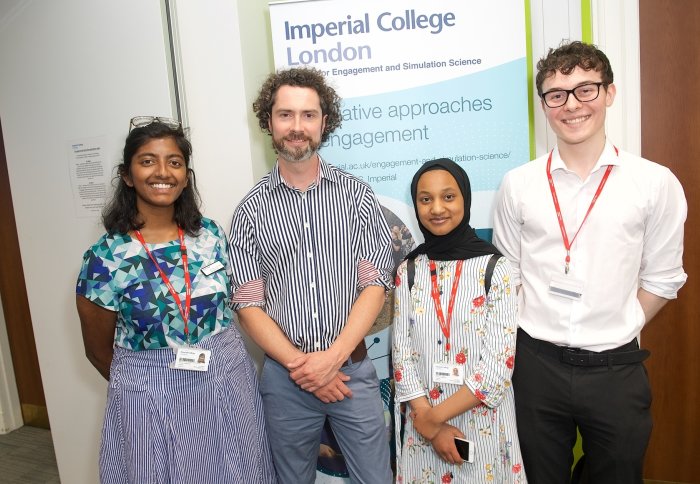Performance gives medical students insights into mental health support
by Maxine Myers

First year medical school students will learn more about accessing College and NHS mental health services from a new performance.
Third year Imperial medical students Joshua Walton, Amna Ahmed and Thivvi Gangatharan have created the medical simulation to show students how they can tackle mental health problems, and to encourage them to seek help at the earliest opportunity.
A recent study showed that nearly one in three medical students worldwide experience depression during their studies. Identifying and supporting students with depression at an earlier stage can improve wellbeing and minimise burnout.
Students will watch the live performance from September, before discussing it and sharing thoughts and feedback in groups. It depicts a medical student, played by an actor, at home, talking to a friend and describing typical symptoms of depression such as low mood and difficulty sleeping.
The student then visits a GP, played by a clinician at Imperial College Healthcare NHS Trust. After discussing medical history, symptoms and other background information, the doctor expresses their concern to the student that they may be depressed, and offers anti-depressants, cognitive behavioural therapy and self-care resources such as support groups and exercise activities.
I think there’s something quite pertinent in showing something visually live. Because it’s all well and good talking about it on social media and putting up posters and things like that, but when it’s actually in front of you, you have to engage with it Thivvi Gangatharan Third year medical student at Imperial College London
The aim is to reduce stigma and increase awareness about depression in medical students as well as highlight services available to them via the College and NHS providers.
Medical simulation is used in medical training to re-enact a patient’s experiences in healthcare. Thivvi explained: “I think there’s something quite pertinent in showing something visually live. Because it’s all well and good talking about it on social media and putting up posters and things like that, but when it’s actually in front of you, you have to engage with it and we hope that by getting our students to witness what potentially one of their peers or themselves could be going through, we could help prevent that in the future.”
The College is supporting improved mental health outcomes for students by developing a new Student Support Strategy. This is led by Hannah Bannister, Director of Student Services. Students can share their ideas on the dedicated consultation page. In addition to the strategy, Professor Stephen Curry (Assistant Provost for Equality, Diversity and Inclusion) and Hannah are working with a diverse group to improve the way in which the College addresses sexual harassment and sexual violence.
Hannah Bannister said: “We know many of the issues that students may come across while studying. Sometimes, the most difficult aspect is knowing how and when to ask for help. The work that Joshua, Amna and Thivvi have done is fantastic. I’m really keen to see how the project and its feedback can help us with reaching and encouraging all of our students to find the right help at the right time.”
After watching the performance students will be asked to provide feedback based on their experience and to identify areas where improvements can be made in accessing services and support.
The project was carried out as part of the students’ year two MBBS Clinical Research and Innovation (CRI) module at Imperial. They presented their work at the launch of the St Mary’s Patient Experience Hub, an initiative designed to use medical simulation and tools to improve the experience of patients and families at St Mary’s Hospital.
The Hub is led by the Imperial College Centre of Engagement and Simulation Science (ICCESS), co-directed by Professor Roger Kneebone and Dr Fernando Bello. They are working in partnership with Imperial College NHS Healthcare Trust and the project is funded by Imperial Health Charity.
Maxine Myers caught up with the trio to find out more out the performance, why they decided to focus on student mental health and future plans.
Article text (excluding photos or graphics) © Imperial College London.
Photos and graphics subject to third party copyright used with permission or © Imperial College London.
Reporter
Maxine Myers
Communications Division